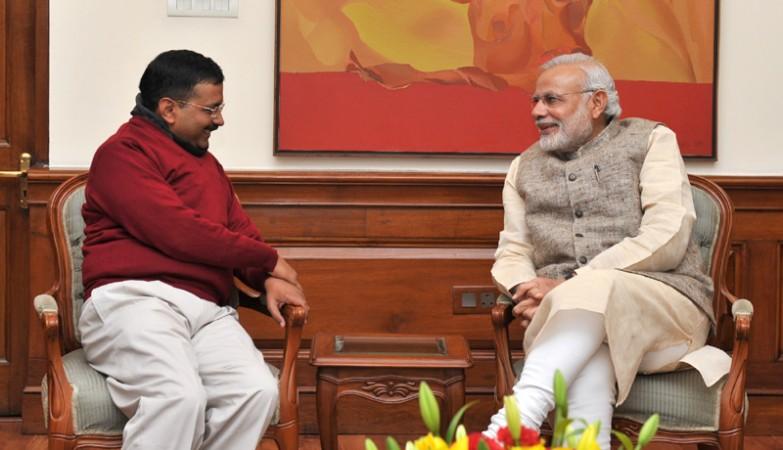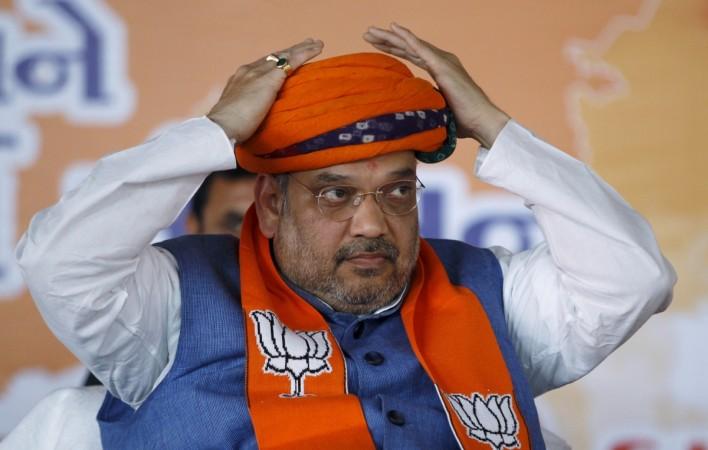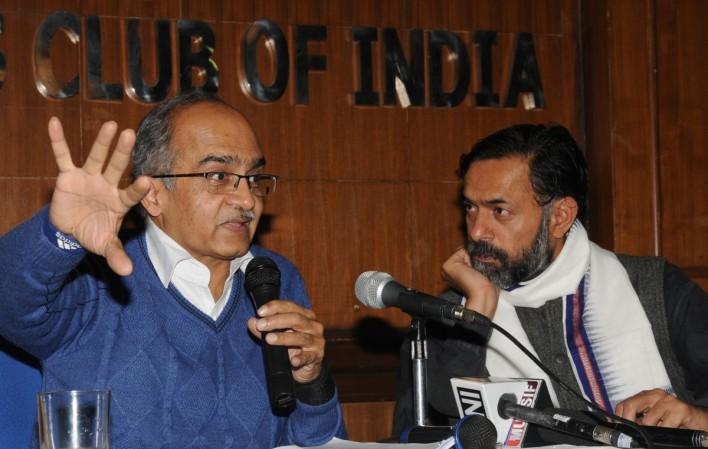
On March 22, the Aam Aadmi Party's (AAP) head, IT and innovation, Ankit Lal posted a tweet saying "AAP is still too young and we will fight, learn and evolve to achieve a better India". A month ahead of the Municipal Corporation of Delhi (MCD) election, did the party concede a defeat in the high-profile election?
Not so long ago, the Aam Aadmi Party (AAP) emerged in India's political life as the product of a new form of politics. It was the culmination of an ideological movement seeking transparency in the public life – something on the lines of Jayprakash Narayan's revolutionary call in the 1970s. After Anna Hazare's initial leadership to the anti-corruption movement, it was Arvind Kejriwal who came up as the representative of the new politics – which looked more democratic as it spoke about people's perception and not the known elitist language spoken mostly by India's political institutions of today.
AAP is still too young and we will fight, learn and evolve to achieve a better India.
— Ankit Lal (@AnkitLal) March 22, 2017
My article in @DailyO_
https://t.co/df5sDWRkZ8
Also read: MCD election results: How it turned out
The AAP made a fantastic debut in electoral politics in December 2013 when it finished as the second-largest party with 28 seats, just three short of the BJP's 31. Kejriwal himself proved to be a giant-killer as he defeated Delhi's longstanding chief minister Sheila Dikshit, who was then leading the government in the city-state for 15 consecutive years. The AAP went on to form the government with the Congress's help though it did not last long. Kejriwal's first stint as the CM ended after just 49 days.
After the 2015 victory, the AAP has only gone down
In 2015, after Delhi spent one year under the presidential rule, Kejriwal got his second chance to become the chief minister of Delhi after the AAP swept the state polls, winning 67 out of 70 seats in the Assembly. The BJP was reduced to just three seats while the Congress drew a blank. It was the highest success of Kejriwal as he led from the front to drub Prime Minister Narendra Modi's BJP, which was on a roll at that point of time by winning power in a series of states after sweeping the Lok Sabha polls of 2014.
But things have only gone haywire for Kejriwal, who was seen as a new hope in Indian politics, from there on. And now, with the decimation he faced in the Delhi civic polls, one can say with certainty that the man has been pegged back by quite a distance now. For those who were seeing him as a probable challenge to Modi in the near future, the script is definitely not saleable at the moment.

Kejriwal was always shaky as an administrator
To analyse Kejriwal's slide, one needs to visit his first stint as the CM. The man who had started his activism against corruption as an ideological crusade, conveniently transformed his battle into one against the BJP. After attacking the Dikshit government and top personalities – either politicians or people related to them — on the question of corruption, Kejriwal took support of the same Congress to form his government. That was the first time the man showed to the world that he is no different when it comes to making use of opportunities. The activist-politician had essentially killed the trust he was enjoying till that point of time.
Kejriwal's direction got changed after the 2013 success; he set his eyes on Modi
Thereafter, Kejriwal set his eyes on Modi – the politician who was fast going up in his political career then. The AAP leader, after hastily ending his episode in Delhi, decided to challenge Modi from Varanasi in UP in the Lok Sabha election which followed a few months after the former quit as the Delhi CM. He indulged in some symbolic politics like taking a dip in the Ganga. But his gesture was never going to deliver success as he hardly had any connection with Varanasi, unlike Modi and BJP for whom the holy city was always politically significant.
As it was expected, Kejriwal faced a record defeat and also nationally, his party could win just four seats (all in Punjab) despite fielding 434 candidates for the general polls. The AAP leadership gradually gave up the ideological fight for cheap populism to race towards establishing a national mark but with Modi already filling up the anti-incumbency space, it was always going to be difficult if not impossible for the AAP. The shrewd politician in Kejriwal wanted to climb up the ladder fast using the reflected glory of Modi by constantly attacking him. But it was never going to deliver.
Calling a popular PM a "ps(h)ycopath" hit Kejriwal's image
The sweeping victory of 2015 perhaps made AAP overconfident again and it repeated the mistakes it had made after the 2013 election results. This time, Kejriwal took on the Centre on administrative and even personal lines.
After the CBI had registered a case against Kejriwal's secretary Rajendra Kumar on charges of misusing his position and raided in Kumar's office and residence, Kejriwal made a scathing attack on Modi calling him a "coward" and a"ps(h)ycopath". It was a suicidal expression for Kejriwal could have dealt the issue politically and administratively. He, instead, made a below-the-belt attack on a PM who has established himself as the most popular leader of the country since Indira Gandhi.
Kejriwal proved himself more as an activist than an administrator
Kejriwal, who had called himself an "anarchist" during his first stint as the Delhi CM, also had several clashes with former lieutenant-governor of Delhi Najeeb Jung. He also faced opposition from the court over appointing 21 parliamentary secretaries on charges of holding dual offices of profit, something which hurt his anti-corruption crusader.

His idea of 'odd-even number' to reduce Delhi's air pollution also met little success. These instances showed overall that Kejriwal understood little in terms of governance and went on acting as an activist even as the chief minister.
The AAP's victory of 2015 was essentially a benefit of doubt that the people of Delhi gave to Kejriwal and the BJP's humiliation was caused by the internal feud which the projection of Kiran Bedi as the CM face had intensified.
But in the MCD elections, the BJP played it wisely by not fielding a single sitting councillor to kill off the anti-incumbency challenge and also in the wake of the recent Assembly election results in which the BJP bagged power in four states while the AAP failed to expand its base beyond Delhi. The AAP's alleged hobnobbing with anti-national elements ahead of the Punjab election also hurt its image in a big way.
AAP cadres have become increasingly demoralised
The loss of face in Punjab also created a problem for the AAP and it was the demoralisation of the party cadre. It is not the first time that the young party has seen implosion in its ranks. Leaders like Shazia Ilmi, Yogendra Yadav and Prashant Bhushan who were enthusiastic voices in the party either left or were expelled over differences with the top leadership and one feels it was an irreparable loss for a 'common man's party'.

The party even lost its Rajouri Garden seat in Delhi in the by-poll earlier this month (in fact it finished third after the BJP and Congress) and saw a number of leaders exiting it for the BJP. These were clear signs that Kejriwal was losing his grip and with the MCD election results confirming the AAP's big loss, it is clear that the party's grassroots capacity has been rocked. It will only be a daydreaming now to hope that the AAP can win any bigger election in either Delhi or any other place in the country now.
AAP's growing animosity with the media
As the AAP started deviating from its core ideology of anti-corruption and got involved in all sort of ugly tussles, both internal and external, besides other controversies concerning its own leaders, its rosy relation with the media worsened. The media had played a major role in creating the new phenomenon in Indian politics on the lines of Arab Spring but as Kejriwal's party got distracted from its goal, its gap with the media only got wider and the process of unmaking of the hope set in. Kejriwal's gesture of hugging convicted politician Lalu Prasad after the latter's alliance with Nitish Kumar beat the BJP in the Assembly elections of 2015 was another major blow to his image in the media.
Kejriwal's stubbornness will sink the AAP further
Kejriwal, by the way he reacts to defeats (even after the MCD poll loss, the AAP is blaming EVMs), displays his obstinate face. And stubborn minds are not amenable to self-assessment. The chief minister of Delhi has been overwhelmed by the taste of power and the ambition to become a national leader and that in a way, suggests that the AAP's future is not bright unless it makes a drastic change in its ways of functioning.

The problems will only multiply for the AAP if it doesn't return to its days of ideological movement to cement its grassroots presence. Though it may sound ironical, the AAP must learn from the BJP on how to turn a social movement into a strong political ideology. Whether Hindutva is good or bad is another story, but forms of this social ideology have constantly fed the party's political machinery.
Kejriwal should also take a cue from Mamata Banerjee's Trinamool Congress, which has also showed signs of organisational weakness because of an ideological void. That party rose entirely on the basis of anti-CPI(M) plank but now with the Left being decimated, it has lost sight of a way ahead and can be left derailed in no time.
AAP can still be given a benefit of doubt for it is young but...
However, since the AAP is a very young party, we can always expect it to return to prominence in the days to come. But for that, Kejriwal must nurture an inclusive movement and not misuse the common man's sentiments to feed his self-centred politics. In fact, someone close to Kejriwal needs to tell him that there are high chances now that he himself might turn into the AAP's liability than asset, just like the story of Rahul Gandhi. For if that happens, the story of AAP and with that, all the hope about the rise of parallel politics, will take no time to get permanently buried in this country.








